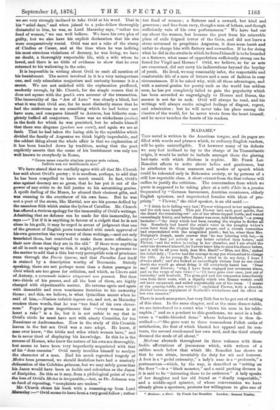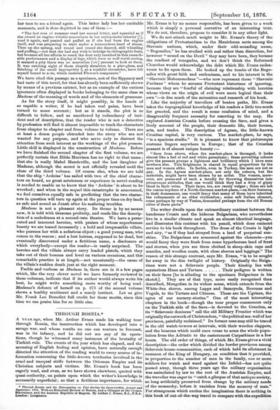MADAME.* THIS novel is written in the American tongue, and
its pages are filled with words and phrases which, to ordinary English readers, will be quite unintelligible. Yet however many of its defects we may feel inclined to lay to the charge of its Transatlantic origin, it would be unfair to include amongst them the glaring
bad-taste with which Madame is replete. Mr. Frank Lee Benedict affects to write about ladies and gentlemen, but
he attributes to them manners and modes of speech which
could be tolerated only in Bohemian society, or by persons of a still less reputable class. A short extract from the first volume will suffice to justify the criticism. The conversation from which we quote is supposed to be taking place at a table d'hôte in a pension frequented by "German baronesses, Austrian countesses, elderly English spinsters, and unprotected females with ideas of pro-
priety." "Flower," the chief speaker, is an old maid :—
" 4 I think he is failing very fast,' Flower whispered to her neighbours, and the sick man heard. This put Flower into sueh good spirits, that she drank the remaining cord ,nts of her silver-topped bottle, and waxed exceedingly frisky, and before dinner was over, told Soaforth "—a young bachelor—" the story which had been causing the virgins to flutter all day. Somebody had heard the saint's voice in the naughty widow's room later than the virgins thought proper, and a chosen committee had expostulated with the misguided youth ; but he, wiser than Mrs. Potiphar's Joseph, made answer that he was laboring with her,—in prayer.'—' And yet nobody is any better satisfied than before,' said Flower, and the widow is crying in her chamber, and I am afraid the saint has drowned himself, for I never knew him to miss his dinner before, and it will be all your fault, dear Mrs. Buell!'—'Miss, not Mrs.,' sighed the faded lady ; I never had the courage to say yes when asked to change the title. As for young Mr. Topler, I tried to do my duty, I hope I always shall ;' and she looked so exceedingly vicious that no one could
doubt she would go about doing it till everybody hated her. Dear ma!' cried Flower; 'why, I have been engaged just seventeen times, and on the verge of ruin twice ! I'd have gone over once, just out of Curiosity,' said Seaforth. The prim girl and her companion immediately rose from their seats, with a dignity which two Roman vestals could not have surpassed, and sailed majestically out of the room. 'I meant at the gaming-table, you wretch ! ' explained Flower, %itli a chuckle, divided between enjoyment of Seaforth's wickedness and its effect on her own enemies."
There is much annoyance, but very little fun to be got out of writing of this class. In the same chapter, and at the same dinner-table, we are introduced to a count who "blows his nose in his table- napkin ;" and as a pendant to this gentleman, we meet in a ball-
room a "noble-blooded dame" whose behaviour is thus de- scribed :—" She gave vent to three tremendous Polish oaths of
satisfaction, the first of which blasted her apparel and its con- tents, the second condemned her own soul, and the third utterly
doomed the souls of all about."
Madame abounds throughout its three volumes with those feeble affectations of jocoseness which, with writers of a
calibre much below that which Mr. Benedict has shown us that he can attain, invariably do duty for wit and humour. 4A foot is a "pedal extremity," a lady's nose is a "proboscis," a portmanteau—which, by the way, is described as "setting on the floor "—is a "black monster," and a maid packing dresses in it is said to be " intrusting them to its embraces." A lady speaks of her daughter and her old friend as "deadly respectable," and a middle-aged spinster, of whose conversation we have already given a specimen, protests her willingness to give one of
Madame: a Novel. By Frank Lee Benedict. London : Samuel Tinsley.
her toes to see a friend again. This latter lady has her excitable moments, and is thus depicted in one of them :-
"The last rose of summer read her second letter, and squealed as if she owned an engine-whistle somewhere in her enthusiastic interior [I], read it again, and panted and puffed as if she had been the engine itself, and was preparing to start uuder a tremendous head of steam. Then up she sprang, and round and round she danced, still whistling and puffing,—not that she had any wish to indulge in chirographic feats, but because all her efforts to reach the door only resulted in this remark- able performance and a display of legs, which were so well worth seeing, it seemed a pity there was no masculine [sic] present to look at them. It was catching sight of those shapely members in a pier-glass, and thinking of the small impropriety I, as a truthful chronicler, have felt myself bound to note, which restored Flower's composure."
We have cited this passage as a specimen, not of the flippancy and bad taste of this novel, for that has already been sufficiently shown by means of a previous extract, but as an example of the curious ignorance often displayed in books belonging to the same class as
Madame of the meaning of words and of the elements of grammar. As for the story itself, it might possibly, in the hands of
so capable a writer, if he had taken real pains, have been turned to some account ; but as it stands, the plot is so difficult to follow, and so smothered by redundancy of inci- dent and of description, that the reader who is not a detective by profession will find it almost impossible to track the characters from chapter to chapter and from volume to volume. There are at least a dozen people obtruded into the story who are not wanted for any purpose, and who serve only to distract the attention from such interest as the workings of the plot possess.
Little skill is displayed in the construction of Madame. Before we have finished the second chapter of the first volume, we are
perfectly certain that Hilda Morrison has no right to that name ; that she is really Mabel Mandeville, and the lost daughter of Madame, although the secret is not officially revealed until the close of the third volume. Of course also, when we are told that the ship Ardoise ' has sailed with two of the chief charac- ters on board, no great astuteness or experience in novel-reading is needed to enable us to know that the ' Ardoise ' is about to be wrecked ; and when in the sequel this catastrophe is announced,
we feel ourselves equally safe in predicting that the two charac- ters in question will turn up again at the proper time on dry land, as safe and sound as Jonah after his seafaring troubles.
Madame is not a pleasant story. Its theme is by no means
new, it is told with tiresome prolixity, and reads like the descrip- tion of a melodrama at a second-rate theatre. We have a perse- cuted and innocent heroine, with praises of whose superhuman beauty we are teased incessantly ; a bold and irrepressible villain,
who pursues her with a nefarious object ; a good young man, who comes to the rescue ; and a lost heiress, supposed to be dead, but eventually discovered under a fictitious name, a disclosure at which everybody—except the reader—is vastly surprised. The heroine and the villain always carry loaded pistols, which they take out of their bosoms and level on various occasions, and this
remarkable practice is at length—net unnaturally—the cause of the villain's sudden death just at the right moment.
Feeble and verbose as Madame is, there are in it a few pages which, like the very clever novel we have formerly reviewed in these columns, indicate that if its author would always write his best, he might write something more worthy of being read.
Madame's defence of herself on p. 273 of the second volume shows a healthy sentiment and a manly instinct. Let us give Mr. Frank Lee Benedict full credit for these merits, since this time we can praise him for so little else.































 Previous page
Previous page